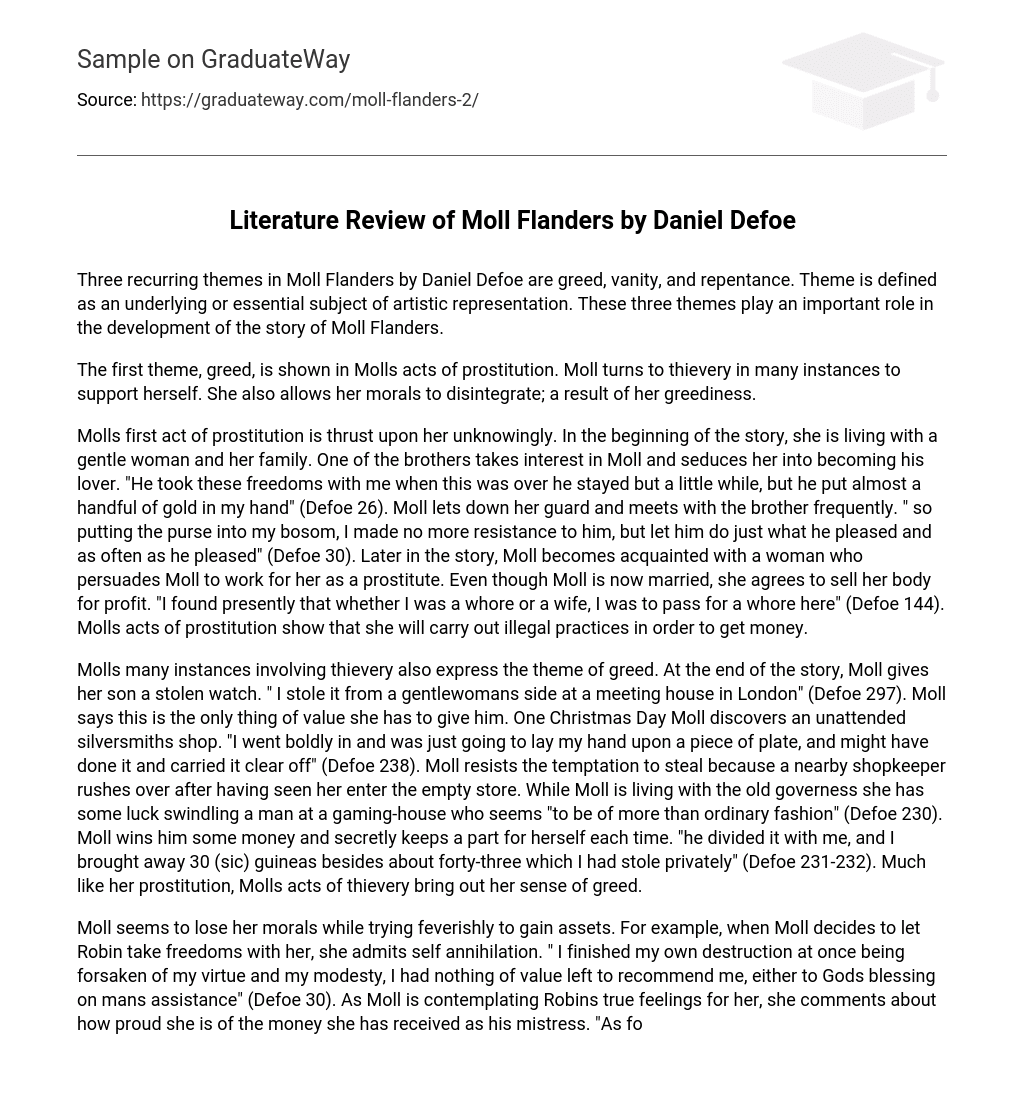Three recurring themes in Moll Flanders by Daniel Defoe are greed, vanity, and repentance. Theme is defined as an underlying or essential subject of artistic representation, and these three themes play a significant role in the development of the story of Moll Flanders.
The theme of greed is evident in Moll’s involvement in prostitution and her resort to theft for survival, leading to her moral decline.
Moll inadvertently has her first experience as a prostitute. Initially, she lives with a kind woman and her family. One of the brothers starts showing interest in Moll and tempts her into becoming his lover. “He engaged in these activities with me, and afterwards he stayed for only a short time but generously put a significant amount of gold in my hand” (Defoe 26). Moll lets down her guard and begins meeting with the brother frequently. “Eventually, by placing the purse into my bosom, I no longer resisted him but allowed him to do as he pleased and as often as he pleased” (Defoe 30). Later on, Moll meets a woman who persuades her to work as a prostitute. Despite being married, Moll agrees to sell herself for financial gain. “I immediately realized that regardless of whether I was a whore or a wife, I was expected to behave like one here” (Defoe 144). Moll’s involvement in prostitution illustrates her readiness to partake in illegal practices for monetary purposes.
The theme of greed is exemplified through the various instances of theft in which Moll participates. Towards the conclusion of the story, Moll gives her son a watch that she stole from a woman at a meeting house in London, explaining that it is the only valuable item she can offer him. On Christmas Day, Moll comes across an unattended silversmith’s shop. Although tempted to steal a piece of silver, she refrains from doing so when a nearby shopkeeper notices her entering the empty store. While residing with the old governess, Moll manages to deceive a well-dressed man at a gaming-house. Throughout these encounters, she successfully helps him win money and discreetly keeps some for herself each time. Similar to her involvement in prostitution, Moll’s acts of theft highlight her inherent greed.
The protagonist, Moll, appears to sacrifice her principles in her relentless pursuit of wealth. For instance, when she decides to engage in a relationship with Robin, she acknowledges her own self-destruction. “I destroyed myself by forsaking my virtue and modesty; I had no valuable qualities left to attract either God’s blessings or human assistance” (Defoe 30). While contemplating Robin’s true feelings for her, Moll proudly reflects on the money she has received as his mistress. “I would spend hours just gazing at the gold, counting the guineas countless times each day” (Defoe 27). Moll concludes that marriage holds little significance as long as she has enough money. She allows Robin’s flattery and generous gifts of gold to satisfy her greed and ruin her character. “My vanity and pride were boundless, while my virtue was meager; I only cared about fine words and gold” (Defoe 26-27). Moll’s moral decay becomes evident as she strives to fulfill her monetary desires. Moll’s involvement in prostitution, thievery, and moments of moral decline serve to highlight the theme of greed in the novel Moll Flanders.
The central theme of Moll Flanders is vanity, which is evident in her upbringing where she was constantly praised for her looks. Throughout the story, Moll’s actions are driven by her vanity, making her susceptible to seduction because she believes any man would fall in love with her due to her beauty. In an attempt to prevent others from making the same mistakes, Moll warns young women to be cautious if they believe they are beautiful and easily trust any man who professes love. Moll even goes as far as saying they should “guard themselves against the knowledge of her own beauty” (Defoe 25). At one point, Moll’s wealth becomes greatly exaggerated and she feels compelled to lie about it, thinking that being wealthy and beautiful will attract a suitable partner. While living with Robin’s family, Moll realizes that she doesn’t need to withdraw from family activities to make way for the sisters, as she hears flattering comments about herself that feed her vanity (Defoe 23). Moll’s extreme attractiveness fuels her vanity and ultimately leads to her vulnerability to the advances of men. She reflects on the first meeting with Robin and the impact her vanity had on their relationship.Moll’s encounter with a gentleman who expresses his love for her and compliments her charm leaves her feeling not like herself. Despite this, she allows herself to be held captive by Robin’s kindness. She notices his thoughtfulness and his affectionate gestures, including numerous kisses and monetary gifts. As a result, Moll starts to disregard her morals and concludes that marriage is not of great significance. She believes that Robin is capable of loving her without the need for them to be wedded. Instead, she becomes consumed with her own vanity, reveling in the pride of her beauty and being adored by such a distinguished man. (Defoe 24, 35, 27)
The text highlights the theme of repentance in Moll Flanders, portraying Moll’s frequent desire to repent but often with a forced appearance. Throughout the story, Moll’s repentance seems insincere until the very end, despite her demonstration of moral strength. The first instance of Moll’s repentance occurs when Robin proposes marriage, and she expresses her remorse for her previous easiness with his older brother. She explains that although she did not possess a conscience towards such matters, she could not bring herself to be both a prostitute to one brother and a wife to the other. This showcases Moll’s strong character as she chooses to persist with this relationship.
Category: English





